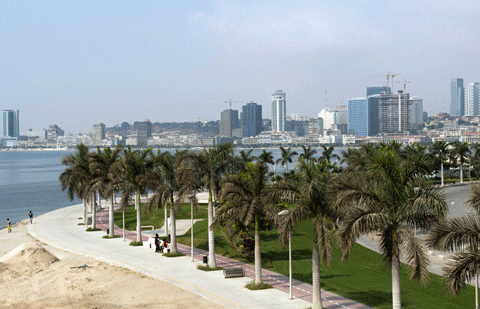China boosts Angola's reconstruction, economic takeoff
Updated: 2014-05-09 15:17
(Xinhua)
Comments Print Mail Large Medium SmallBEIJING - Over 10,000 kilometers away from China, there is an African state that enjoys an incredibly close bond with the world's second biggest economy. In fact, though not particularly big, it has overtaken many other African countries to become the second largest trading partner of China on the continent. That state, remote yet intimate for China, is Angola.
Since Angola struggled out of a civil war in 2002, thousands of the Chinese labor force has embarked on a journey to the devastated land to join the labor-intensive reconstruction efforts and help the country walk out of the quagmire step by step.
Zhao Ke, a Chinese contractor who has spent almost 10 years in Angola, has accomplished dozens of construction projects in the state, including colleges, hospitals, residential complex, and infrastructure.
He said his Angolan clients were happy with these projects for their high quality, low cost, and fast speed, compared with European competitors.
The construction branch of China's CITIC Group Corporation, which ran a much larger business in Angola, has won a bid to build a social housing project, K.K., in the southern suburb of capital Luanda, a project which could be the largest residential community under construction in the world.
The first phase needs an investment of $3.5 billion and covers an area of 88,000 square kilometers, on which 533 high-rise apartment buildings, roads, shops, schools, post offices, churches, water and electricity supply systems will be built.
Angolan President Jose Eduardo dos Santos, who has visited the construction field several times, hopes that the K.K. project will become a model project known for its high quality and high standard.
During a visit to Angola in 2010 as vice president, Chinese President Xi Jinping encouraged Chinese companies to demonstrate the fine spirit of hard working and perseverance and overcome hardships to get the work done well.
Zheng Gang, chairman of China H&S Group, told Xinhua his firm is seeking a long-term and localized strategy of development in Angola.
The company, operating in Angola since 2006, is engaged in building construction, construction material supermarket, furniture, and an iron structure factory among others. It employs 500 local people in addition to Chinese workers.
H&S is about to embark on the next step and take part in Angola's process of industrialization, which is the country's direction of future development, Zheng said.
The Export-Import Bank of China, which provided huge preferential loans to projects in Angola, is happy to see that no bad debt has ever occurred in the transactions in the southwestern African state.
According to incomplete statistics up to 2010, the bank has financed the construction of 56 schools, 24 hospitals; the remoulding of 360 urban and rural communities; the building of 10 water processing plants and a TV station; the agricultural irrigation covering an area of 75 million hectares; building roads as long as 830 kilometers, and 3,200-kilometer-long cable wires.
So far, bilateral cooperation between China and Angola has included many areas that are related to people's livelihood and expanded employment in the country.
Between 2002 and 2010, Angola recorded an average GDP growth of 12 percent yearly and continued its robust momentum despite the crunching global financial crisis.
Thanks to its strength of growth, Angola has become a hot market in Africa as well as the world. Many credit ratings companies like Moody's have upgraded Angola's government ratings.
With no doubt, the technology, labor and capital from China have played an important role in the Angola miracle, Zhao Ke said.
He said the Angolan government has been talking a lot about getting rid of dependence on the oil sector, diversifying the local economy and realizing an initial industrialization.
China's investment and technology is indispensable to this end, he believes.
From agriculture to manufacturing to the service sector, the outlook for China-Angola cooperation is bright.
But he warned that the quick money period has ended and only companies that are determined to study the Angola market seriously and address its real needs can prevail.
Related:
Chinese premier arrives in Angola for visit







